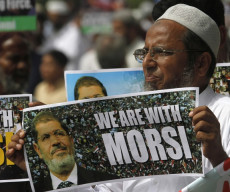
The assertion that Egypt’s military overthrew the country’s democratically-elected president, Mohamed Mursi, in the July 3 coup is a simplistic and partial description of what went awry with the democratisation process in the Arab state. While Egyptian armed forces led by General Abdel Fattah alSisi did indeed remove Mursi from office via putsch, the former president and his party, the Muslim Brotherhood, played a critical role in creating the situation where the general staff was, perhaps, left with no other choice.
The debate over which side, more egregiously, undermined democracy has become a polemical one, and of little value. There are far greater geopolitical implications of the coup.
Though the Muslim Brotherhood and its counterparts in the Arab/Islamic world had been on the path of mainstream politics for decades prior to the outbreak of the Arab spring, Mursi’s election in June 2012 represented a major case study vis-a-vis democratisation and Islamism in practice. Therefore, the derailment of the nascent democratic process a year later is unlikely to push Brotherhood type Islamist movements towards radical and militant paths to power. But there are other far-right Islamist groups, which unlike the Brotherhood, only in the aftermath of the 2011 collapse of the Mubarak government, gave up their erstwhile belief that democracy is un-Islamic and opted to participate in the democratic process.
Mursi’s ouster could push some such forces to abandon democracy and opt for a jihadist route. Fortunately for Egypt, many of its Salafists (such as those in the country’s second-largest religious party, Hizb alNour) were either apolitical until the Arab spring or had long renounced violence as is the case with Gamaah alIslamiyah and Tandheem alJihad. In fact, given its history, Hizb alNour, in supporting the coup, exhibited pragmatism. What this means is that the fallout — in terms of an Islamist turn towards violence — will unlikely be on the scale of what happened in Algeria in 1992, where the country was plunged into a massive insurgency that claimed as many as 200,000 lives over the following decade.
That said, the overthrow of Mursi is reverberating across the wider Arab/Muslim world, especially in Afghanistan, where there are efforts underway to bring the Taliban movement into the political mainstream, though the much talked about public talks between the US and the Afghan Taliban have yet to take place. But the opening of the Taliban’s office in the Qatari capital created an expectation that such negotiations will happen sooner rather than later.
Afghanistan’s jihadist movement, which maintains significant reservations against democratic politics, has sought to engage in talks towards a post-Nato power-sharing arrangement. However, Mursi’s ouster is bound to reinforce the Taliban’s aversion for electoral politics. In addition to ideological reasons for opposing democracy, the Taliban leadership are bound to look at the overthrow of the Mursi government and cite practical reasons why participating in mainstream politics doesn’t pay off. For the Taliban, Mursi’s ouster only reinforces their belief that political authority is a function of military force as opposed to public mandate. Being used to armed struggle, the group would have to significantly reinvent itself in order to enter the political mainstream. There is little incentive to do so if they see that well-established mainstream Islamists are not succeeding.
Islamabad’s interest in pushing for US-Taliban talks is based on the thinking that if the Afghan Taliban can somehow be brought into a political process, then that could help Pakistan with its own Taliban rebels. The mainstreaming of the Afghan Taliban could encourage some of their Pakistani counterparts to follow suit, which could then allow Islamabad to more effectively, militarily deal with the irreconcilable transnational jihadist types.
This strategy hinges on the assumption that the Afghan Taliban can be brought into the political mainstream. And now with the overthrow of the Mursi government, the situation is looking even further grim.
Published in The Express Tribune, August 23rd, 2013.
Like Opinion & Editorial on Facebook, follow @ETOpEd on Twitter to receive all updates on all our daily pieces.
COMMENTS (4)
Comments are moderated and generally will be posted if they are on-topic and not abusive.
For more information, please see our Comments FAQ
































































Excellent article. really enjoyed your perspective. Finally op-eds are not an ad nauseum recitation of facts and incidents but show some insight and opinion.
Afghanistan’s jihadist movement, which maintains significant reservations against democratic politics, has sought to engage in talks towards a post-Nato power-sharing arrangement. However, Mursi’s ouster is bound to reinforce the Taliban’s aversion for electoral politics
Now that is unfair. What then Taliban would be suffering from is confirmation bias i.e. search for specific instances which supports one's standpoint while ignoring contrary evidence. Hasn't an Islamic government successfully out maneuvered the military in Turkey? Isn't there a robust democratic Muslim majority country in the form of Bangladesh? The fact is that the Taliban have a belief and will just find items to bolster their argument.
..."The mainstreaming of the Afghan Taliban could encourage some of their Pakistani counterparts to follow suit, which could then allow Islamabad to more effectively, militarily deal with the irreconcilable transnational jihadist types. --- Hahahahaha!!! Surely, the joke of the century! If it was funny, we would actually laugh (OUT LOUD, instead of just in words!)